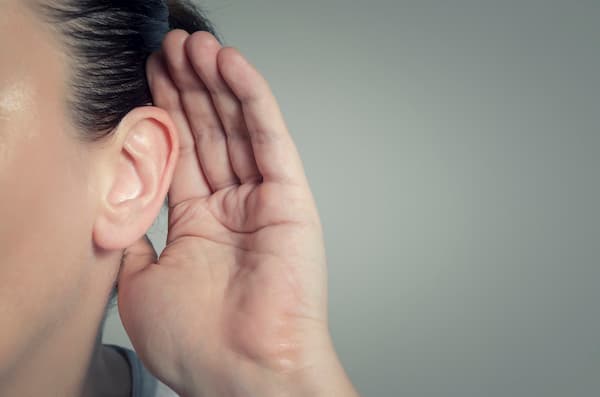
Memorial Hearing Answers Your FAQs
__________________________________________
How Can I Recognize Hearing Problems?
Oftentimes, hearing problems begin gradually, making it easy to miss the early signs. Most patients won’t experience significant discomfort or pain, and although friends and family may start mentioning that maybe there’s hearing loss, not everyone may realize that there have been changes in their loved one’s hearing quality. However, there are a few questions you can ask yourself to determine if you (or a loved one) is experiencing hearing problems:
* Do you/they have issues hearing what is being said unless directly facing the speaker?
* Do you/they regularly ask people to repeat themselves one or more times?
* Do you/they find it challenging to follow a conversation that involves more than two people?
* Do you/they have difficulty hearing in crowded places, such as meeting rooms, restaurants, places of worship, and shopping malls?
* Do you/they notice that it is particularly difficult to hear women or children speaking?
* Do you/they often find that you prefer the television or radio volume louder than others?
* Do you/they complain of a buzzing or ringing in your ears?
* Do you/they feel that it often sounds like people are mumbling?
If I Think I Have A Hearing Problem, What Do I Do?
If you suspect you have a hearing problem, or simply want to speak with a professional about your concerns, you should schedule a visit with an experienced audiologist/hearing healthcare professional for an evaluation. Ideally, you should meet with a doctor that specializes in the diagnosis and treatment of hearing loss, rather than a general practitioner or big box technician.
A professional audiologist has the specialized training and expertise needed to provide a highly accurate diagnosis and treatment plan, helping you choose the best option to fit your specific needs.
Doesn’t Hearing Loss Only Affect Old People?
Many people are surprised to learn that hearing loss isn’t an issue exclusively reserved for the elderly. In fact, about 65 percent of people dealing with hearing loss are younger than age 65. About 6 million people in the United States, aged 18-44 years, have hearing loss, with 1.5 million of those people of school age.
Hearing loss can occur at any stage of life and stem from a wide variety of causes including damage, genetics, excessive noise, reaction to certain treatments or drugs, infections, and more. There are also different types of hearing loss, each one stemming from a varying cause.
Are There Hearing Aids for Single-Sided Hearing Loss?
If you’re dealing with single-sided hearing loss, there are options available to help restore your hearing. It consists of a hearing aid on one side and a transmitter on the other.
The CROS system is designed to provide an excellent solution to patients who have varying levels of single-sided hearing loss, with two different options available:
* For patients who have normal hearing in one ear but a hearing loss in the other, the CROS system is utilized to restore hearing function.
* For patients who have little to no hearing in one ear, and measurable hearing loss in the other (“better”) ear, the BiCROS system is often recommended.
How Do Hearing Aids Work?
On a basic level, hearing aids function like battery-powered microphones that can take sounds like speech and other noises and convert them into electrical signals.
These signals pass through an amplifier, where they are strengthened. Then, a receiver converts the signals back into sound, channeling the now-amplified sound through a small tube or earmold and into the wearer’s ear canal.
Today’s hearing aid technology has allowed for the incorporation of a range of useful features, including the option of a digital hearing aid (as compared to a traditional, analog device).
A digital hearing aid makes it possible to customize the device to perfectly match the specific type of hearing loss, as well as provide amplified speech while minimizing unnecessary background noises. There are many types of hearing aids, often distinguished by three initials that describe how the specific hearing aid is worn.
The latest models even connect to the user’s smartphone, allowing for iPhone as well as Android users to be able to control their hearing aids, stream phone calls, music, movies, and much more.
Why Should You Undergo a Hearing Exam?
Even if everything seems fine with your ears, it still helps to receive a check-up. It does not matter your age. You should schedule routine hearing checks for yourself and your children to at least get a baseline of where your hearing is at that particular time in your life so if anything changes, you have something to compare it to. It may be possible to undo some of the damage that has already occurred if it is related to ear health issues. If not, you can at least get the treatment you need to start hearing better again quickly.
Why Should You Treat Ringing in Your Ears?
The American Tinnitus Association estimates that roughly 50 million Americans suffer from some variation of tinnitus, which is a constant ringing in the ears or other noises in your head or ears. You will notice this when you frequently hear a clicking, hissing, buzzing, or swooshing sounds coming from your ears. It may be a symptom of another health problem, such as high blood pressure or temporomandibular joint disorder. Either way, you can start hearing better soon and sometimes alleviate some of those sounds.
What is Reverse Balance Disorders?
Certain ear problems can result in balance disorders. If you experience dizziness for seemingly no reason, then you may have a case of vertigo. Audiologists can diagnose balance problems as well as issues such as Meniere’s disease or BPPV.
How to Identify Hearing Loss?
Most people will experience hearing loss gradually. However, the sooner you can go in for treatment, the better off you will be in the long run. You need to go in for treatment when you notice you have a hard time hearing in noisy places. You may also experience extreme, sudden hearing loss, which is typically a result of a viral attack of the inner ear. It is important to seek help immediately if that is the case.
Contact Memorial Hearing Today!
When you have questions about your hearing, Memorial Hearing has the answers. We have an experienced, friendly staff who will see you right away to determine the root cause of any issues you have experienced. Book your appointment today.
_________
Image Credit: Getty/natasaadzic
© Memorial Hearing
